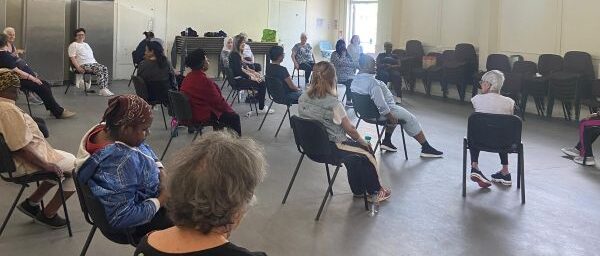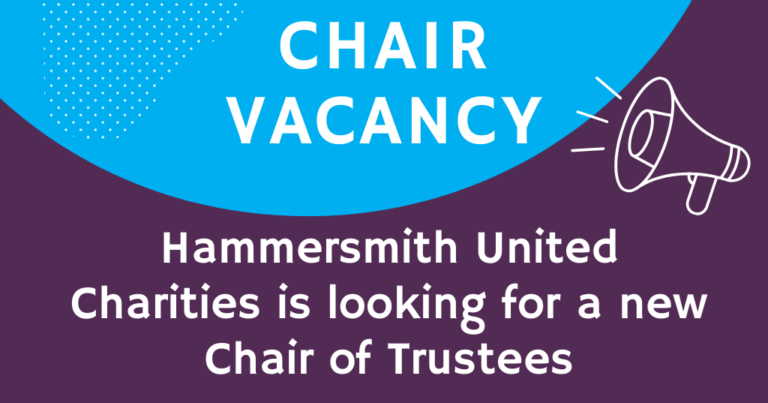
Could you be our next Chair of Trustees?
We are looking for an exceptional individual who shares our values and aspirations for Hammersmith. If you have the vision, leadership skills, and a genuine connection to our mission, we would be delighted to hear from you.
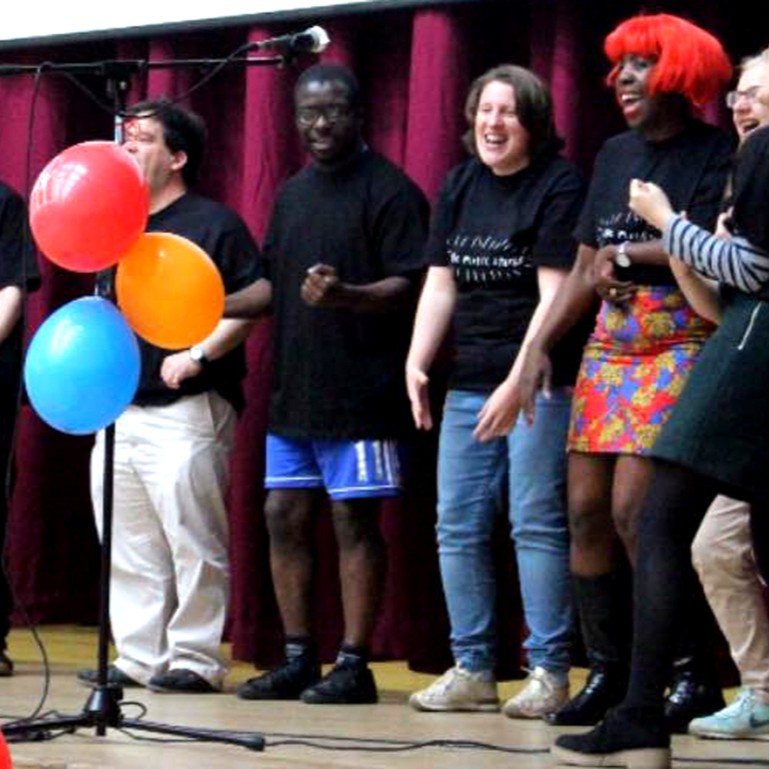
Making the arts accessible
Turtle Key Arts is knocking down barriers to enable more people to take part in theatre, drama, music and other arts projects.
Turtle Key Arts was founded in 1989 as an accessible arts space. Producer Niamh Hanns explains, “The idea was to create an accessible arts venue where people could see performances from a range of artists. While we no longer have that venue, accessibility is still at the heart of everything that we do.”
The charity is now a performance arts company working with a portfolio of dance, circus and theatre companies. Many of the freelance artists it works with have a disability or face other barriers to participating in the arts. Amici Dance Theatre Company, for instance, is a unique inclusive dance theatre company for disabled and non-disabled performers. Amici’s shows challenge conventional attitudes about disability.
Every production includes outreach events, and Turtle Key Arts also runs regular education and participation projects, with a focus on including people who are often excluded from the arts, such as those who are neurodiverse or have a disability. Key Club, for example, is a monthly arts and social club for 18–30-year-olds on the autism spectrum, while Turtle Song is a singing and songwriting project for people living with dementia and their companions and carers.
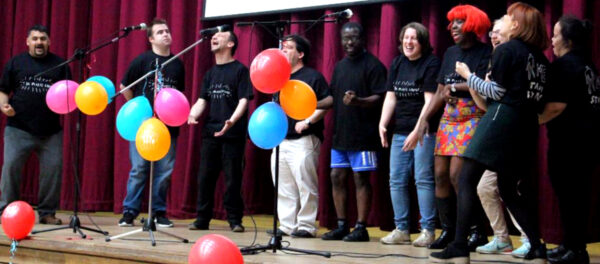
Unlocking creative potential
Niamh says, “The UK is still in a period of austerity where the arts aren’t prioritised and where there are so many barriers to accessing the arts. That has an impact on people’s wellbeing and ability to grow in confidence and to be themselves.
“At Turtle Key Arts, our tagline is ‘Unlocking creative potential’. Everyone has something valuable to bring to the world artistically. Sometimes you need support in doing that, which is why organisations like ours are so important.”
Removing barriers to the arts
To Turtle Key Arts, ‘accessibility’ isn’t just about removing physical barriers. As Ellie Park, a producer at Turtle Key Arts, shares, “We want to remove as many barriers as possible. All our outreach projects are free to participants, as price is often a barrier, especially for younger people. With our dementia project, if transport is a barrier to people participating, then we’ll provide that.”
One barrier that the charity aims to tackle is lack of confidence, particularly for people who are disabled, disadvantaged or socially excluded. Niamh says, “The arts are often seen as something that only certain groups can take part in, so people sometimes think, ‘It’s not for me; that’s not something I can do.’ We make sure that our projects are as inclusive as possible by putting things in place so that people can have that creative output.”
As an example, one of the charity’s projects is Key Words, which supports dyslexic young people to write a play. Participants dictate the lines and actions to scribes, so if they lack confidence in writing things down, that doesn’t become a barrier to being creative.
The impact of Turtle Key Arts’ work cannot be overemphasised. Being able to participate in the arts can improve mental wellbeing, reduce isolation and increase confidence. As the daughter of a Turtle Song participant shared, “I cried silent tears of sorrow, of pride, of happiness, of loss, of admiration, of gratitude and more. Thank you for bringing joy to my mum, for accepting her just as she is and for making her truly happy. I have not seen her smile like that for a long time, today she was my beautiful, intelligent, kind & caring, fun loving mum again.”
The JOY festival
One of the highlights in Turtle Key Arts’ calendar is JOY – a disability arts festival for people in West London, which it runs in partnership with Hammersmith and Fulham Arts Festival and the Lyric theatre. JOY is led by a steering group of disabled artists and practitioners. The festival was relaunched this year, and Turtle Key Arts commissioned a music piece by and for disabled artists. Niamh explains, “A group of disabled people who are musicians or who have an interest in music are working with a professional composer, director and musician to create a new song cycle on the theme of joy. It will then be performed at the Lyric.” Ellie adds, “The participants are aged 18 to 70. It’s good to have something inclusive for all adults, as a lot of opportunities cut off at 25.”
The commission was funded with a grant from Hammersmith United Charities, and the piece was performed at the festival on 3rd July. Niamh says, “Hammersmith United Charities have been really supportive of us and our work on the festival over the years. It’s great to have a really engaged local funder.”
Find out more
If you’d like to take part in a Turtle Key Arts project, please visit the charity’s website: www.turtlekeyarts.org.uk
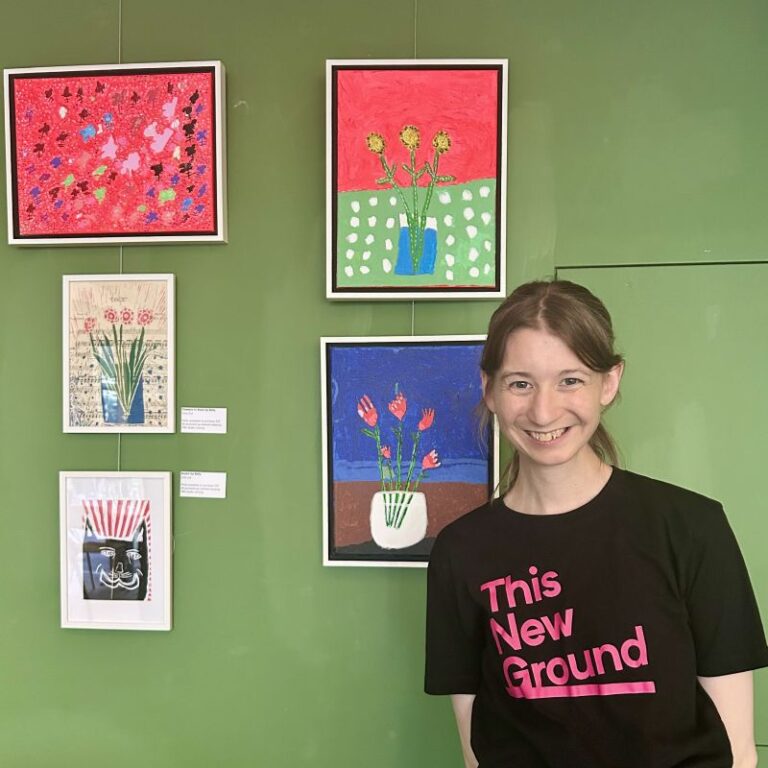
This New Ground
Art and music can often feel inaccessible to people who have a learning disability. This New Ground is helping to change that.
While This New Ground originally started as a choir, it has since grown into a community interest community (CIC) delivering a diverse and ambitious programme of creative engagement – elevating the voices and artistic talents of people who are neurodivergent or who have a learning disability.
The CIC is headed by co-founders Lucy Groenewoud and Nathalie Russell-Clarke. It has two hubs, one in London and one in Portsmouth. Lucy explains, “Nathalie started the choir because she recognised there was a real gap in provision for adults over 25 who have a learning disability. Over the years, this has developed into a thriving creative hub. More recently, we have gone on to open an art studio in the Creighton Centre.”
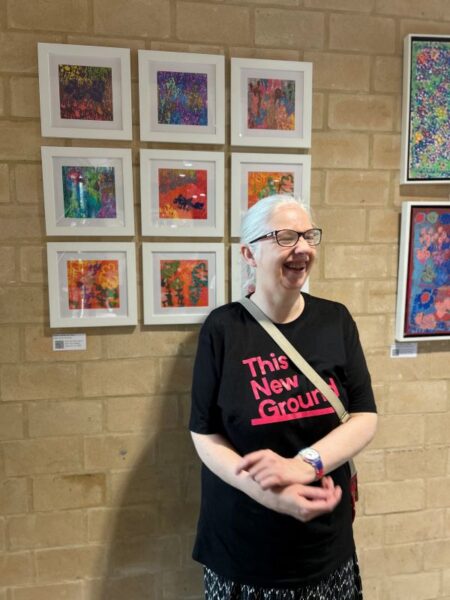
Changing perceptions
Lucy shares, “There’s a long-standing perception that art created by people with a learning disability belongs in community centres. It’s often seen as craft, not art. But thankfully, things are changing. Slowly but surely, cultural perceptions are shifting, and the arts sector is beginning to recognise the value, depth and complexity of work by neurodivergent artists and artists with a learning disability.
“A powerful example is Nnena Kalu, a phenomenal artist with a learning disability, who has just been nominated for the Turner Prize – one of the most prestigious awards in contemporary art. Her recognition marks an important moment of visibility and validation for many others still fighting to be seen.
“We’re working to challenge outdated and negative perceptions around learning disability and creativity. Our goal is to get the work made by artists in This New Ground seen, valued and celebrated by wider audiences.
“One exciting step in that journey is our new partnership with Lush, who are transforming artwork by some of our artists into beautiful Knot Wraps and greetings cards. For the artists, it’s more than just visibility – it’s the powerful realisation that, ‘Actually, this is something I could have a career in.’ It’s about recognition, opportunity and a sense of real creative ownership.”
Offering paid work opportunities
Research by Mencap shows that just 26.7% of people with a learning disability are currently in paid employment. This New Ground is able to offer two avenues for paid work. Firstly, it helps artists to sell their work. Secondly, it hires them to support businesses who want to make their communications more accessible.
Lucy says, “We believe in the voices and the talents of people with a learning disability and of those who are neurodivergent. For us, it’s really important that people have the opportunity to experience paid work and being in a workplace.”
Tackling isolation

Along with creativity and employment skills, there are many other benefits felt by This New Ground participants. Lucy says, “Isolation is a really big factor for a lot of the people we work with. A lot of them don’t have support, they live independently and they aren’t working, so our sessions are a social lifeline where they can develop relationships. Singing and creating art also increases confidence and gives people a real sense of achievement. Creative spaces like ours offer community, expression and connection in ways that are truly transformative.”
Martin, a participant at This New Ground’s art group, says, “It’s about getting out and about and meeting new people and being artistic. I didn’t think I had any art skills, but clearly I do, and I have grown to enjoy art.”
Platforming people with lived experience
Lucy and Nathalie want to ensure that people with a learning disability can help to guide and steer the CIC. Lucy shares, “We’re working to diversify our leadership and have people with lived experience on our leadership team.”
The Hammersmith choir is now peer-led, with a keyboardist and drama facilitator on hand to offer support.
Hammersmith United Charities’ support
“Quite often people will come in and say they don’t have enough money to buy food,” says Lucy. The Creighton Centre has been able to organise food vouchers, and Hammersmith United Charities has provided This New Ground with a grant to help cover running costs.
Thanks to grant funding and volunteer support, the CIC is able to keep the art club and choir free for participants. At a time when many are facing deep financial hardship, this means access to creativity, connection and community remains open to everyone.
Lucy says, “We’re incredibly grateful for the funding we receive; we wouldn’t be able to operate without it. It enables the whole group to take part in a vital weekly social activity – something that makes a real difference to people’s lives.”
Get involved
This New Ground activities are held at the Creighton Centre, 378 Lillie Road, London SW6 7PH.
TNG Studio: Open Tuesdays, please email lucy@thisnewground.com if you’d like to join a supported studio session.
Art group: Tuesdays, 1–2.30pm
Singing group: Tuesdays, 3–4pm
The groups are free to attend. Please email lucy@thisnewground.com if you’d like to join.
Work by This New Ground artists is being exhibited at Sands End Arts & Community Centre until 31st July 2025.
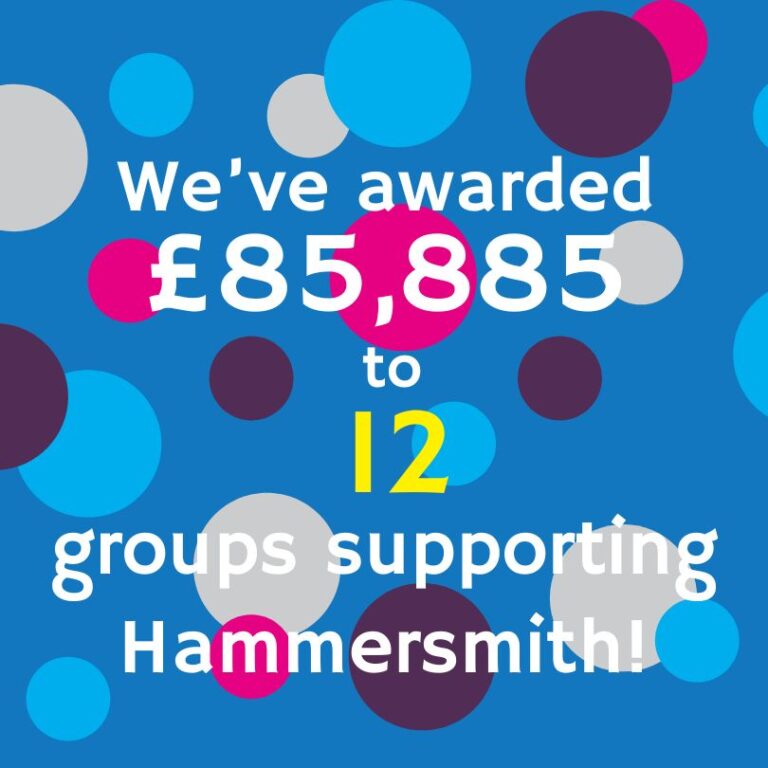
February 2025 grants announced
12 groups have been awarded grants totalling £85,885.
Hammersmith is a vibrant, welcoming area with numerous charities and other local organisations making a positive difference to people’s lives, day in, day out. We’ve been supporting these grassroots causes for many years, by awarding Community Grants to groups that make a tangible impact to people’s lives, including those working to alleviate poverty, enrich children’s lives, and support some of the most vulnerable people in Hammersmith.
Our most recent grant round in February 2025 saw 12 groups awarded grants totalling £85,885. The full list of grant holders is as follows:
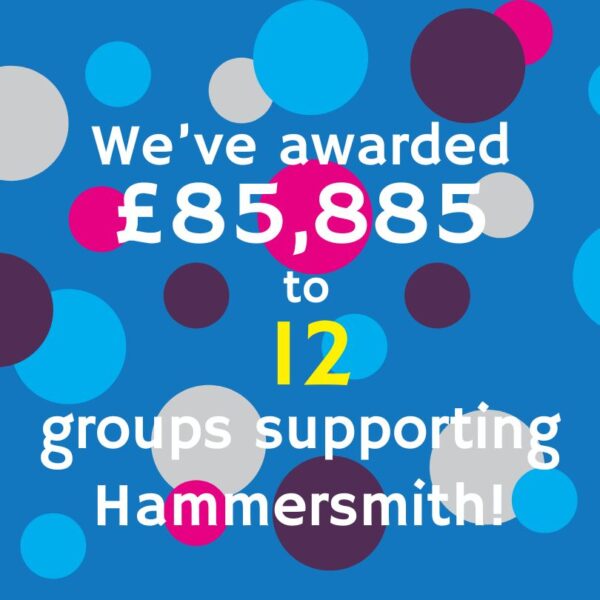 John Betts Primary School: £12,200
John Betts Primary School: £12,200
The grant will enable up to 28 children to receive play-based therapy, helping them to thrive at school and beyond.
Urban Partnership Group: £10,000
The 13-week Strengthening Families programme funded by our grant will help 15 inmates at Wormwood Scrubs to strengthen ties with their families.
Age UK Hammersmith & Fulham: £9,052
Age UK’s Shopping Service helps housebound and/or disabled older people to retain their independence. You can read more about the service in our case study.
Kulan Foundation: £7,500
The Kulan Foundation provides a range of services for people from a global majority background. The charity is putting its grant towards staffing and premises costs so that it can continue its popular homework club, parent workshops and other projects.
Dads House: £7,300
The grant will fund the energy costs of Dads House’s food bank, lunch club and family law clinic, as well as providing essential supplies for single fathers and their families.
The Reanella Trust: £7,200
With the help of our grant, The Reanella Trust is able to offer mental health counselling, mentoring and group activities for Black children who are disabled or who have bipolar. Read our case study here.
The WILDE Foundation: £6,550
The WILDE Foundation is using its grant to help it run ‘Women Heal’ workshops, which support women to manage grief, trauma and mental ill-health, and to run local activities such as its Writers Festival.
Hammersmith and Fulham Foodbank: £6,185
Hammersmith and Fulham Foodbank relies on volunteers to create food parcels and support people in crisis. Our grant will enable the charity to train volunteers in areas such as ‘conversations with vulnerable people’ and ‘mental health awareness’.
Community Massage London CIC: £5,898
The grant will fund massage and reflexology sessions for people who may otherwise not be able to access them.
Solidarity Sports: £5,000
Solidarity Sports works with disadvantaged children who are recovering from complex trauma. The focus is on transformational play-based activities. Our grant will help to fund equipment and other expenses for children under 5.
Turtle Key Arts: £5,000
The grant will fund performance art by and for disabled artists in the borough, to be performed during the JOY festival.
Grove Parent and Toddler Group: £4,000
The Grove Parent and Toddler Group gives adults and children a fun, supportive place to come together each week. The grant will be put towards staffing and location costs. Read our case study here.
How to apply for a HUC Community Grant
We’re particularly keen to hear from smaller, local organisations in our area of benefit, which have a strong connection to their community and a working knowledge of the local area. Your project can be one-off or ongoing. What interests us most is the difference you’ll make to the local people most in need.
Please complete our Eligibility Quiz before applying, and then contact us at grants@hamunitedcharities.com to tell us about your project. We like to talk to applicants before you apply so that we can get a better understanding of what you’re doing and answer any questions you may have.
Find out more
- Learn more about our Community Grants
- Read our grants FAQs
- Hear from other organisations we’ve supported
- Read more about how to apply

Making exercise affordable for all
Women Aid and Empowerment brings people together through Zumba.
From park runs to salsa classes, group exercise is a great opportunity to socialise, get fit and have fun. However, monthly membership fees can make exercise unaffordable for people on a low income. What’s more, as Hanna Teffera shares, “Many people find going to the gym difficult for other reasons, including subtle racism, ageism, body shaming, or the pressure to keep up with high-intensity classes that are too challenging for people with mobility difficulties or reduced fitness.”
Women Aid and Empowerment
 To address these barriers, Hanna partnered with two other women to set up Women Aid and Empowerment. She explains, “We decided to set up our own community interest company after hearing that a popular programme, which offered free fitness classes for women in White City, was closing. We realised that most of the women in our community are economically disadvantaged and would struggle to afford to join a gym. They were very upset about losing the free classes as this was often their only opportunity to exercise and socialise with other people.”
To address these barriers, Hanna partnered with two other women to set up Women Aid and Empowerment. She explains, “We decided to set up our own community interest company after hearing that a popular programme, which offered free fitness classes for women in White City, was closing. We realised that most of the women in our community are economically disadvantaged and would struggle to afford to join a gym. They were very upset about losing the free classes as this was often their only opportunity to exercise and socialise with other people.”
The CIC now runs classes in Zumba, chair-based yoga and chair-based exercise at three locations in Hammersmith & Fulham, including White City Community Centre. Unlike most exercise classes, these ones are free and welcome people of all abilities. Hanna is a professional fitness instructor so leads the classes. One participant, Eunice, says, “Hanna’s chair-based exercises have been a game-changer for me! Her classes are not only accessible but also incredibly effective. I’ve noticed significant improvements in my strength and flexibility, all while having a great time.”
Crucially, the classes also give people the chance to socialise afterwards. Hanna shares, “I have a lot of retired and widowed people attending. Many used to be active but had become ill or disabled. Some had become isolated in their home. Since coming to the class, their health has improved and so has their loneliness, as they feel that they have somewhere to go. They talk after class, meet up with each other and feel more connected with their community.
“For instance, one lady was very lonely. All her children had left home so she was by herself. Because of our class, she has found a best friend. Another lady became very depressed after losing her son. Doing exercise and seeing other people has really helped her.”
Participants have also reported other health benefits, including improved sleep and reduced stress.
One regular participant, Joanna, shares, “Hanna’s exercise sessions are a fantastic way to socialise and meet new people! Her warm and welcoming approach creates a friendly atmosphere where everyone feels included. Not only do we get a great workout, but we also have the opportunity to connect and build friendships. I’ve loved getting to know others while staying active, and Hanna’s positive energy makes every session enjoyable. It’s the perfect blend of fitness and fun.”
Find out more
Women Aid and Empowerment runs Zumba, chair-based yoga and chair-based exercise classes at:
- White City Community Centre
- Matthew Hall Community Centre
- Acton Vale
- Chiswick Town Hall
For more details and to book, visit https://waelondon.org/ or contact Hanna on h.teffera@yahoo.co.uk, 07383 117676.
Subscribe to our newsletter
"*" indicates required fields

